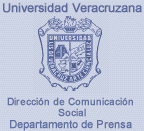
| Año 6 • No. 228 • Junio 26 de 2006 | Xalapa • Veracruz • México |
Publicación
Semanal
|
UNIVERSITY
OF VICTORIA Experiencia canadiense en la UV |
||
| Este texto se publica en inglés, tal como apareció en Canadá, que relata la experiencia de los estudiantes de la Universidad de Victoria, Canadá, que estudiaron en la Escuela para Estudiantes Extranjeros de la Universidad Veracruzana | ||
| (Lynne
Von Luven worked as a print journalist for 25 years in Western Canada
before becoming journalism and writing professor. She has a PhD in
Canadian Literature from the University of Alberta and has taught
at UVic since 1997). Outside our classroom door, students gather in the central courtyard for the 10-minute break. And in the streets outside the school, the Xalapa traffic is building towards its mid-afternoon crescendo, roaring and thunking over the cobblestone streets. But here inside Classroom 4, my two colleagues and I continue to concentrate, our ears standing at right-angles to our heads, as our Maestra Mónica explains, in Spanish, the complexities of current-day Mexican political parties. There will be an election in early July, and candidates’ posters can be seen all over the city. The experience reminds me of how hard dedicated students actually work to learn new ideas. From April 24 through May 5, along with six colleagues from the University of Victoria’s Faculty of Fine Arts, I tried to improve my long-neglected Spanish, which I originally studied 20 years ago, as a graduate student. Needless to say, in the intervening years I have somehow managed to forget more than I ever knew. (What’s up with that? my own first-year students might ask.) We seven are enrolled in Xalapa’s Escuela para Estudiantes Extranjeros, part of the Universidad Veracruzana (UV), with which University of Victoria (UVic) has established an exchange program. The second largest university in Mexico, UV has more than 60,000 students spread out across 30 campus sites throughout the state. As foreign students, we’re here for two weeks, taking three hours of classes daily, from 11 a.m. to 2 p.m., five days a week. We do have homework, but nothing that slows our sampling of the delights of local restaurants and clubs. Our instructors Mónica and Ángel, two wonderfully patient, vivacious young teachers, have plenty of experience bringing extranjeros to some level of Spanish competency. What amazes me is their composure: they never wince as we mangle their mother tongue with ill-founded enthusiasm. Xalapa (pronounced HAL-lapa), the capital of the state of Veracruz, is a city of 500,000, located about 1,400 metres above sea level in the eastern flange of the Sierra Madre mountains, about two hours by bus from the sweltering seaport of Veracruz. It was the site of a pre-Columbian community called Xallapam, meaning “spring in the sand”. Captured by Cortés in 1519, Xalapa was originally a market town along the Spanish route to Mexico City. Although Xalapa’s main business today involves government and education, I did note a huge military base on its outskirts when I took the bus to Veracruz. Often, as I listened to residents explain Mexican customs and culture to us, I thought how similar their views on nationalism are to those expressed by many Canadians. After all, both nations live uneasily with the “elephant next door” that separates us. Proud to claim North American status, Mexicans spring from an ancient and complex past; most Mexicans today consider themselves part of a dominant mestizo culture, a blend of both the original indigenous residents and the Spanish invaders. Despite the two nations’ differences in population and climate, one of the strongest bonds shared by Canadians and Mexicans is their resentment of the American empire that separates them. In casual conversation over the course of two weeks, I heard at least three Xalapa residents cite the now famous remark of Porfirio Diaz, president of México from 1877 to 1910. “Poor Mexico”, Diaz observed, “so far from God and so close to the United States” Since I arrived back home, I’ve been thinking a lot about what creates successful nationhood. And I’m wondering: maybe Prime Minister Stephen Harper should rewrite Diaz’s lament to reflect a clearer reality about his own nation: “Poor Canada –so far from Mexico and so close to the United States”. |
||
